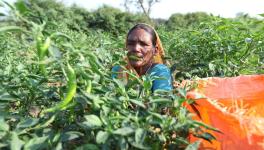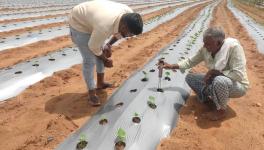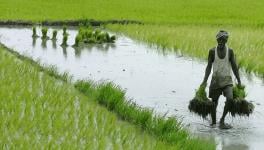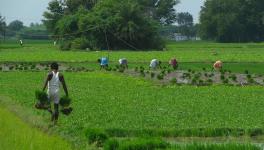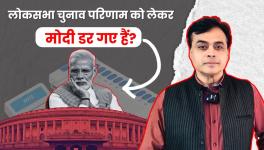Global Agribusiness Mega-Mergers: Rise of Monopoly Power
The proposed global mega mergers of six agribusiness corporations; of Bayer with Monsanto, Dow with DuPont, and ChemChina with Syngenta, are part of an ongoing consolidation in the agribusiness sector. If the mergers are successful, the three mega corporations will control more than 60% of the global market in commercial seeds and agro-chemicals. Newsclick speaks with reputed genetic scientist Dr. Suman Sahai, the chairperson of http://genecampaign.org/ to understand the implications of the deal on India. Sahai makes the argument that with India’s size and diversity, it has the ability to counter the adverse implications of this rise in monopoly power. Whether the Government acts in the public interest remains to be seen.
Rough Transcript:
Benny Kuruvilla: Hello and welcome to Real News Network and Newsclick. Today we are in conversation with Dr. Suman Sahai, the chairperson of gene campaign; a group that works on issues such as sustainable agriculture, genetic diversity and intellectual property rights and seeds. And today we are in conversation with her on the planned mega mergers of six agribusiness corporations. Dr. Sahai, welcome to the program.
So this current merger that is afoot globally, where six mega agriculture corporations are merging; Dow with DuPont, Monsanto with Bayer, ChemChina with Syngenta, the concern is that this will lead to dominance in market share. Can you give us a sense of why is this merger happening simultaneously and what are the likely sort of impacts?
Dr. Suman Sahai: Simultaneously it has to happen because if two of them get together they become too big for the rest. So everybody has to sort of keep a pace in order to compete on size now. Why is it happening? I think it’s of a peace with the kind of developments that you have seen over the last years of consolidation, of all interest in agriculture particularly, globally. So first we had this phase of the industrialisation of the food chain then you had the integration of food with inputs into agriculture. So you saw all these life science corporations which were actually chemicals. These are all people who moved from chemicals, not moved from, but added on to their chemical base, the seed components so that in the agriculture sector you’re covering all bases. So this is a sort of consolidation of the agriculture sector. The intention is of course global dominance of this field; of the field of agriculture, of the field of food production and of the field of value chains in agriculture. At the bottom of this, somewhere is the understanding that as we enter into climate change, the era of climate change and as we move towards global population that is certainly rising, we are looking at food as a very strategic resource. And it’s not looked at as a strategic resource only today. Go back to the famous words of Henry Kissinger who said words to the effect that if you control a nation’s food, you control the nation. So the understanding that food has been a very important resource has been around, but it hasn’t become main-stream like now. There is this understanding that whoever has the food has a huge advantage and I don’t think that this is unconnected or disconnected with the fact that the big food giants are now coming together and becoming bigger.
Benny: One of the concerns is that if this plan merger of these six companies into three, go through, they will control some 70% of the agro chemicals market and some 60% of the commercial seeds market. There has already been a lot of opposition from farmers, from unions, from researchers to sort of reject this merger. Can you give us a sense of what would be the impacts on farmers, consumers and on the environment if they come together?
Dr. Sahai: See this is very basic thing. The greater the choice on the market, the better off the consumer is. In this case the consumer is the farmer, essentially the farmer and later on then the consumer of the food. So the moment you start to restrict the supply and choices, the person or the category of people who are going to suffer the most are the consumers of those products which are the farmer in this case. The large giants are getting larger and they will be available to control the product which means they can control the flow and availability of the product and this amounts to blackmail. You can use this; it’s a very effective tool. They’ll certainly control the prices. You’ve seen in the pharmaceutical sector; the Fewer the number of agencies that are producing a drug, the higher the patent protection, higher the prices. Everybody who has been working on the intellectual property rights area has seen that it’s a very direct linear correlation. You’ll anticipate the same thing in the seed sector.
Having said this, I’d like to point out that there are many choices and if something is happening at the global level, say Monsanto and Bayer or ChemChina and Syngenta, it need not necessarily affect us. Let us remember at the end of the day, this we must always remember, national legislation will always trump international developments. In most cases of this kind – Quasi-commercial, economic related to vulnerable sectors, you do have a choice. If your national capacity is strong then you can counter this. Say for example any one of these giants or all three of these giants when they happen, will control your pesticides and seed. Will you manufacture your own pesticides and seeds? A country the size of India need not really have worries on that score. I wish to underline this to try and counter the kind of, it hasn’t begun to be hysterical yet but there is a strong hysteria developing on “good heavens there is all of this merger taking place”. So what if Dow and DuPont are merging. You don’t have to buy their products.
Benny: To link to that for instance there are regulatory challenges happening in the European competition commission, in the US courts, in brazil, in India the competition commission is examining the deal. So do you see a legal sort of challenge possible?
Dr. Sahai: Yes off course. I mean if you want to have Dow and DuPont here you will have to have regulatory oversight and regulatory mechanisms. But what I’m saying is that if these are not things you are able to control then you don’t have to have a partnership with these agencies. The point that I’m making is, that India is large enough, has a huge domestic market. It has scientific and research capacity and in the area of seed god knows we have a very diffused and very capable competence in the form of farmers who produce seed.
Benny: But the way that the farmer’s ability to counter these big transnational’s are being diluted is through trade agreements that India is signing. For instance you have, I mean the TPP tried to bring in the UPOV into those 12 countries that were the part of it.
Dr. Sahai: TPP was very bad news.
Benny: But now you have Trump exiting from the TPP and you have the regional comprehensive economic partnership in which Japan and South Korea are trying to push. I mean, so you off course need to challenge the corporations but you also need to challenge the trade agreements. I want to get your sense of the international movement for progressive agriculture.
Dr. Sahai: See we have a very good track record to learn from, as far as our experience of WTO is concerned. We went from a stage of near paralysis because our government agencies are completely incapable of comprehending and therefore responding to what the Uruguay round had demanded. First of all, the patenting of seeds that it had demanded. But from there we’ve come a long way and we’ve learnt a lot. Even agencies in government have learned a lot and those lessons will come in very handy now. And I think more than that, the level of confidence that we have, that you can take these guys on, so what’s the big deal? India has after all given itself a farmers’ rights legislation and gene campaign has been a very big part of that process which is the only legislation in the world that gives rights to farmers. So we’ve done that. Now, then comes the question of political will. If you have a government that simply refuses to listen to any sense and do not consult with anybody and go its own happy way and gets into a ditch, that’s the terrible thing to happen, it’s a sad thing to happen and again something like that happen is very difficult to take a stand. But I think as a process yes if you want to deal with Dow DuPont, you have to get into the competition commission’s recommendations. You’ll have to have regulatory oversight. If you can swing a deal that’s advantageous for you, after all of these merges are also facing great big caveats. That’s why they’re not happening over night.
Benny: they have to exit certain businesses before they can...
Dr. Sahai: They have all such of conditionality soyou can also pose conditionality’s and say that we will allow so and so to function under these conditions. And if we can control the Indian state of affairs through enlightened assertive national action and national policy then I don’t think that we need to be in a flap. It’s when we are weak domestically and give in to pressures and give in to blandishments. And I’m afraid we’re very vulnerable to blandishments in all forms and you know exactly what I’m talking about. And then what can regulatory oversights do?
Benny: Also link to the fact that agriculture is a state subject and since gene campaign works across the country, engaging the state governments. Do you see sort of possible progressive laws that state governments can put in place being challenged or is that a good way to go because agriculture is a state subject as well?
Dr. Sahai: You know this ‘agriculture is a state subject’ thing works only up to a point and it works more domestically. At all international levels and international decisions we’ve gone through this process during the WTO also. The executive has the right to take a decision. Its implementation may run into conflict with the states. Some states may come around and say ‘okay fine you’ve done a deal, your business, we are not letting it happen in here in X Y state. But that’s a tough one and I think the best course of action for us is for the central government, for the executive for realise and I think it’s our job to try and educate them. It will depend on how receptive they are or not, whether they open up channels for disperse and dialogue or not. But I think civil society must play its role in bringing together I would say the informed citizen with educational materials. You know, a lot of people would like to know a little bit more but they don’t know where to get that information so very succinct information you know handbill type things that spell out the dangers. The consolidation of seed means somebody else will control the seed and its availability and its price and the implications for your average daily middle class consumer is more expensive food. I don’t think a lot of people hoot about what happens to the farmer but they will give a hoot about what happens to their own food prices and monthly budget etc. So that’s how we have to tailor it I mean all of us who have been involved in campaigns for these last several years should put our heads together and mount a challenge really for the government.
Benny: Thank you very much for sharing your insights with us. We will come back to you because these mergers are still sort of work-in-progress and we hope to get you back to the studio for further issue as well.
Dr. Sahai: Thank you.
DISCLAIMER: Please note that transcripts for Newsclick are typed from a recording of the program. Newsclick cannot guarantee their complete accuracy.
Get the latest reports & analysis with people's perspective on Protests, movements & deep analytical videos, discussions of the current affairs in your Telegram app. Subscribe to NewsClick's Telegram channel & get Real-Time updates on stories, as they get published on our website.









